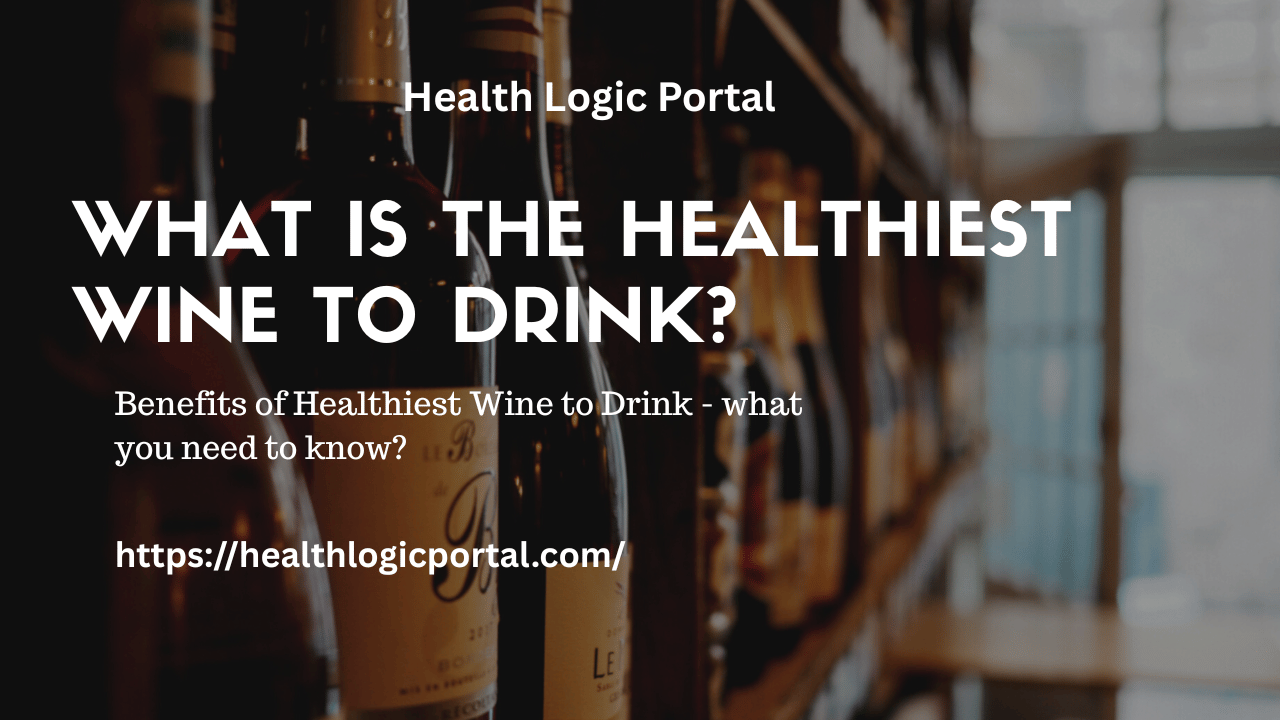Wine has long been associated with social gatherings and indulgence, but did you know that certain wine types can provide health benefits when consumed in moderation? If you enjoy a glass of wine and are curious about which options are the healthiest, you’re not alone. I am also with you. I want to tell you that the growing interest in wine and health is partly due to beneficial compounds in wine that may contribute to heart health, improved metabolism, and even better mental well-being.
While the health benefits of wine are often debated, But I have done research that moderate consumption, especially certain types of wine, can positively affect your overall health. But with so many varieties available, you may wonder which is the healthiest to drink. Whether you prefer red, white, or sparkling, understanding the health effects of different wines can help you make an informed decision.
I will tell you in this article the different types of wine, the key health-promoting compounds they contain, and what you should know to maximize their benefits. We’ll also examine how much wine is considered beneficial and what the experts say about enjoying wine responsibly.
If you’re looking to read more about a specific topic, simply click on any title in the Table of Contents, and you’ll be instantly taken to that section of the article.
Benefits of Healthiest Wine to Drink – what you need to know?
Wine is not just a pleasurable beverage; it may also have numerous health benefits if you consumed responsibly. Studies suggest that wine—especially red wine—contains several compounds that can increase your heart health and boost brain function, and even boost your immune system.
These benefits come from natural antioxidants, polyphenols, and other grape bioactive compounds, as well as fermentation. However, You need to note this. While moderate wine drinking may have health perks, drinking excessively can negate these benefits and lead to serious health risks.
Wines are rich in antioxidants, but if you’re looking to boost your health with other fruits, you might want to check out the 6 health benefits of water apple, a refreshing tropical fruit that also offers numerous health advantages.
Is wine good for your health?
Wine has been touted for improving cardiovascular health, reducing inflammation, and extending lifespan. But I think that one to two glasses daily—may contribute to a healthier heart and mind. Due to substances like resveratrol and flavonoids, which are mostly found in red wine, moderate wine consumption is associated with a lower risk of heart disease. These compounds help prevent harmful cholesterol buildup and support healthy blood flow.
Understanding the role of antioxidants in wine
Did you know? Antioxidants are essential in shielding our bodies from oxidative stress’ Which can lead to chronic diseases and aging. Red wine, in particular, is rich in antioxidants such as flavonoids, resveratrol, and tannins, all of which help combat free radicals in the body. Free radicals are unstable molecules that can harm cells and cause diseases including Alzheimer’s, cancer, and heart disease. By consuming antioxidant-rich wines, you can help reduce oxidative stress and support overall health.
How moderate wine consumption can benefit your heart?
Drinking wine in moderation has long been associated with heart health. Polyphenols, specifically resveratrol, found in wine, are believed to protect the lining of blood vessels, reduce inflammation, and improve blood circulation. But I’ve done a lot of searching on this and I’ve found out that moderate wine consumption can help lower blood pressure, reduce the risk of heart disease, and even prevent strokes. For individuals who enjoy a glass of wine daily, these heart-health benefits may help contribute to a longer, healthier life.
The best types of wine for healthy lifestyle
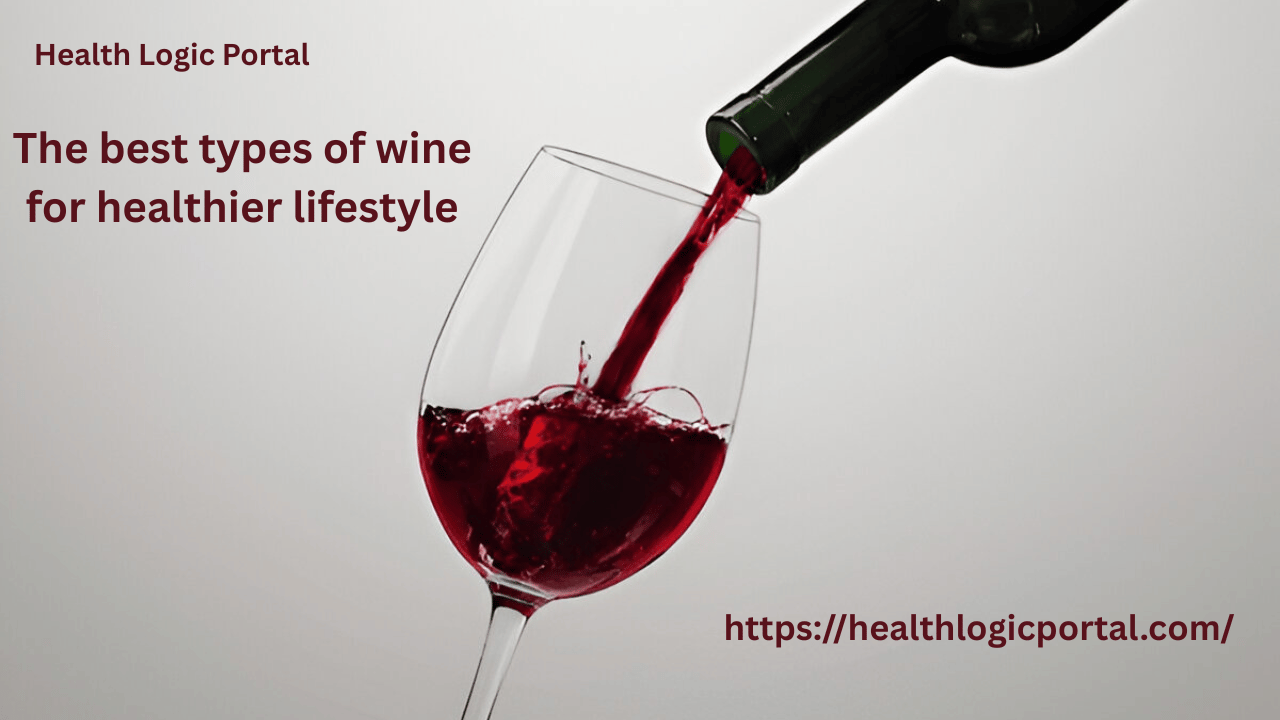
When choosing a wine that aligns with your health goals, a few
Red wines like Pinot Noir, Cabernet Sauvignon, and Merlot are rich in resveratrol and other polyphenols, which make them some of the healthiest choices for heart health. White wines, such as Sauvignon Blanc and Chardonnay, are lower in antioxidants but can still offer moderate health benefits when consumed in moderation. Organic and biodynamic wines, which are made without pesticides and additives, may also provide a cleaner option for health-conscious individuals.
Red wine vs. white wine: which is healthier?
I’ve often heard my friends praise it, and I really feel the same way. Red wine is a healthier option due to its higher antioxidants like resveratrol and flavonoids. These substances have anti-inflammatory and cardiovascular health benefits. However, white wine is still a good option for health-conscious drinkers. While it may lack the high levels of antioxidants found in red wine, it is lower in calories and sugar, making it a good choice for those watching their sugar intake or calorie count.
Exploring the resveratrol myth: is it really that powerful? I tell you.
Resveratrol is a powerful antioxidant found in grape skins and is widely credited with many heart-health benefits of red wine. However, I have read that studies have shown its potential in protecting blood vessels and reducing inflammation, resveratrol is only present in small amounts in wine. To truly reap the benefits of resveratrol, you must regularly consume wine in moderation. resveratrol may be one of several antioxidants contributing to the overall health benefits of wine.
I found the top 5 healthiest wines to drink for longevity
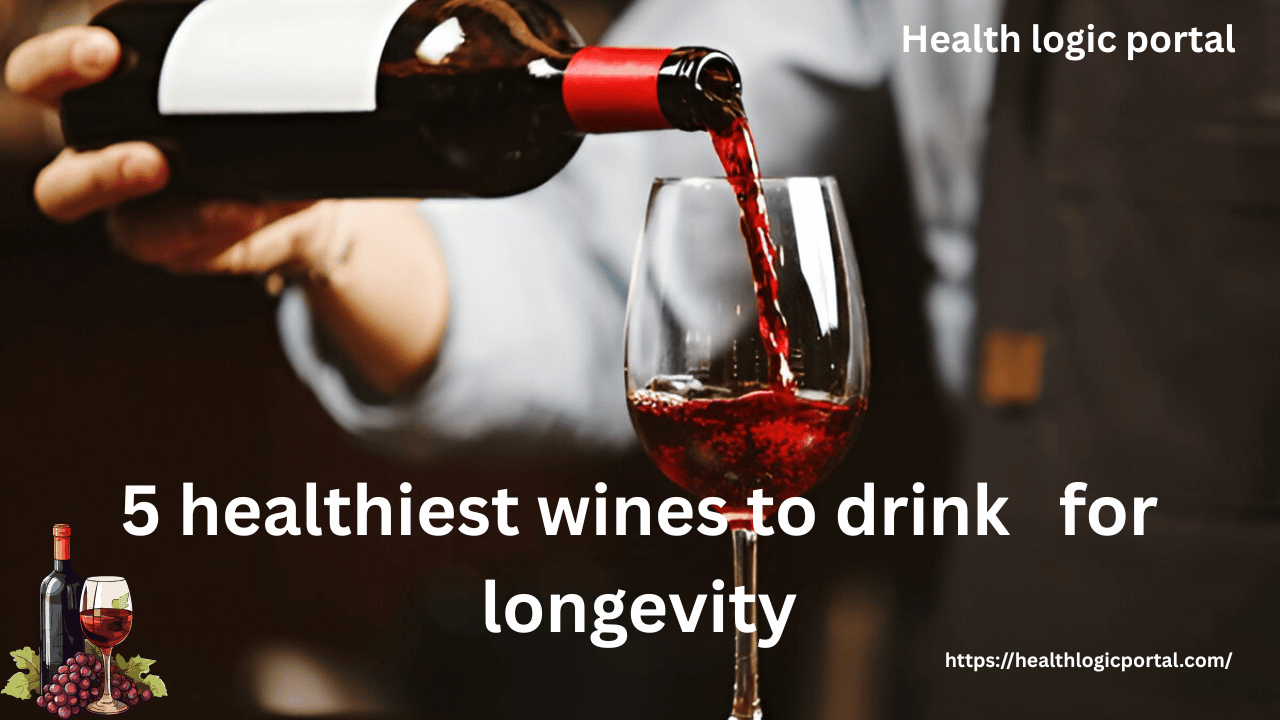
Some wines stand out due to their higher levels of antioxidants and polyphenols. Here are five healthiest wine to drink that may contribute to longevity and overall health:
- Pinot Noir – known for having a lot of resveratrol.
- Cabernet Sauvignon – Packed with antioxidants for heart health.
- Merlot – Contains heart-healthy flavonoids.
- Sauvignon Blanc – A white wine option rich in antioxidants.
- Zinfandel – Known for its anti-inflammatory properties.
How can wine help you with weight loss and metabolism?
Moderate wine consumption has been shown to help with weight management in some instances. Some studies suggest that resveratrol may aid in fat burning and improve metabolism by regulating blood sugar levels. However, since too much alcohol can lead to weight gain, it’s crucial to balance wine with a nutritious diet and regular exercise.
The role of polyphenols in promoting overall wellness
Polyphenols are plant-based compounds in wine with antioxidant, anti-inflammatory, and anti-aging properties. They help protect cells from damage, support healthy digestion, and may even help lower the risk of chronic diseases like cancer and heart disease. Red wines, in particular, are a rich source of polyphenols, especially resveratrol, linked to various health benefits.
Can wine improve your mental health?
The calming effects of wine, particularly when consumed in small amounts, can promote relaxation and improve overall mood. Furthermore, wine’s antioxidants may help shield the brain from cognitive decline and neurodegenerative illnesses.
Wine and gut health: what the research says
I find emerging research that moderate wine consumption may positively impact gut health by promoting the growth of beneficial gut bacteria. Wine, especially red wine, contains prebiotic compounds that help feed good bacteria in the gut, supporting digestion and overall gut health.
How to choose the healthiest wine for your diet
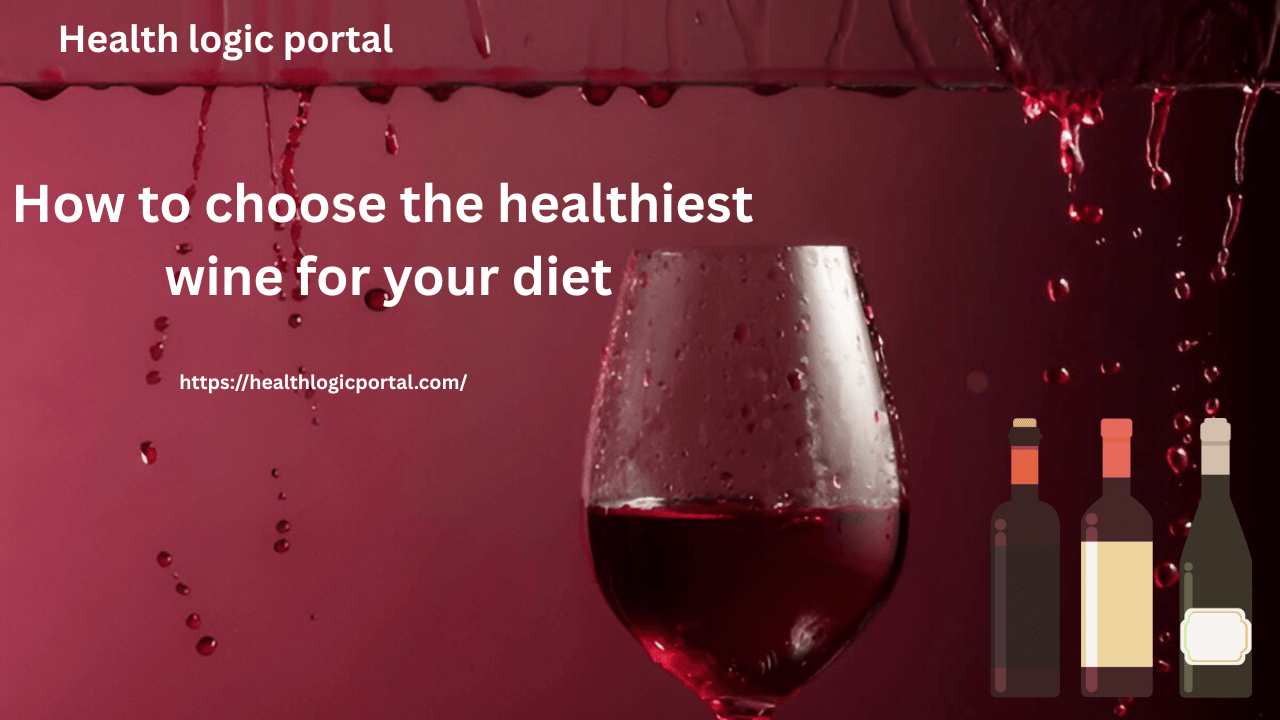
When selecting wine i want to give you advice for its health benefits, look for options rich in antioxidants and low in sugar. Organic and biodynamic wines may be healthier, as they are made without harmful pesticides or additives. Dry wines with a lower sugar content are typically the best options for health-conscious drinkers.
Organic vs Conventional wines: which is better for your health?
Organic wines are made without synthetic chemicals, pesticides, or preservatives, making them a cleaner choice for those concerned about chemical exposure. While organic and conventional wines have similar beneficial antioxidants, organic wines may offer a more natural and sustainable option for health-conscious individuals. You can learn more about organic wines and their production process on Wikipedia.
The link between wine and reduced risk of chronic diseases
Moderate wine consumption has been linked to a reduced risk of several chronic diseases, including heart disease, diabetes, and certain types of cancer. Antioxidants and polyphenols found in wine help protect against oxidative damage, inflammation, and cell degeneration, which can contribute to chronic health conditions.
How much wine should you drink for maximum health benefits?
While moderate wine consumption may offer health benefits, sticking to recommended guidelines is essential. For women, this generally means up to one glass (5 ounces) per day, while men can enjoy up to two glasses. Drinking in moderation helps maximize the health benefits of wine without the adverse effects of excessive alcohol consumption.
Pairing wine with a healthy diet: tips and tricks
Wine can be a great complement to a healthy diet when paired with nutrient-rich meals. I want to tell you, look for wines that pair well with fruits, vegetables, whole grains, and lean proteins. A balanced meal, combined with moderate wine consumption, can enhance the food’s and wine’s overall health benefits.
The truth about sugar in wine and its impact on health
While wine can contain sugar, notably sweeter varieties, dry wines tend to have the least amount. Consuming too much sugar can lead to weight gain and other health issues, so if you’re looking for a healthier option, stick with dry wines, which are lower in sugar and calories.
How can you find high-quality, healthy wine on the market?
When you’re shopping for wine, look for organic, biodynamic, or sustainably produced options. These wines are made with fewer chemicals and preservatives, which may be a healthier choice. Additionally, choosing wines with higher levels of antioxidants, such as red wines, can provide extra health benefits.
FAQs
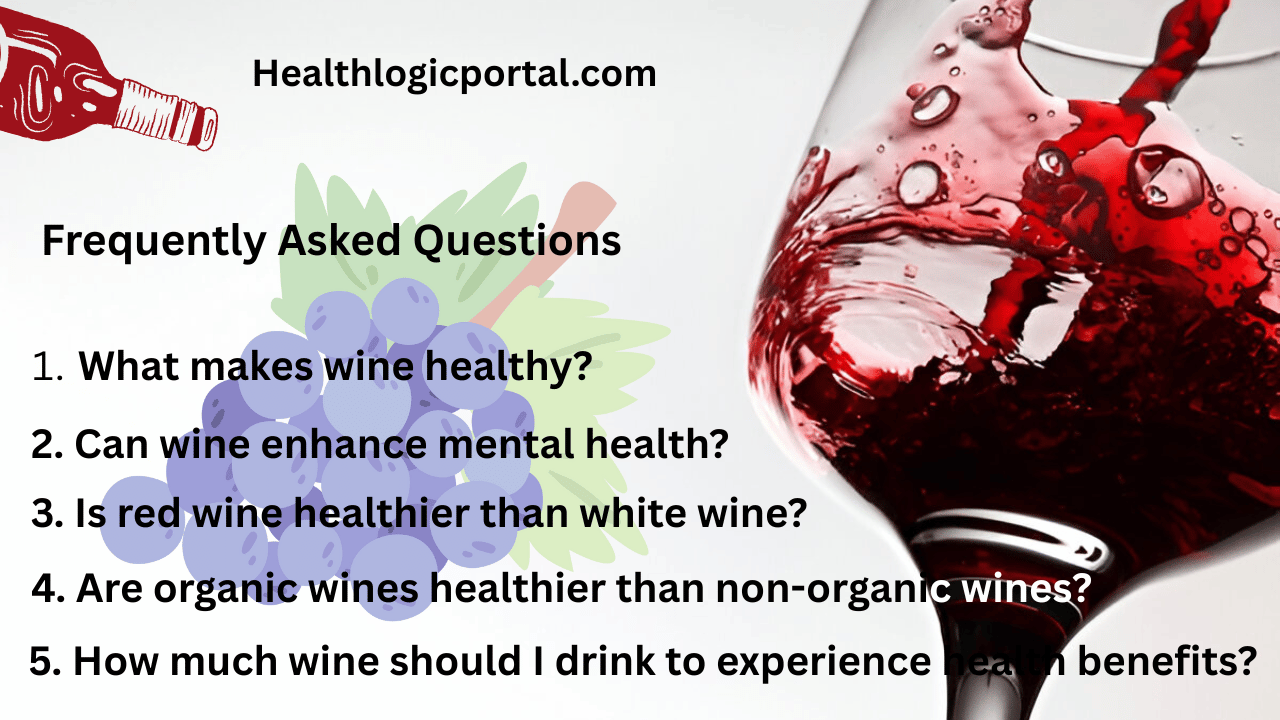
Is red wine healthier than white wine?
Red wine is often considered healthier due to its higher levels of antioxidants, like resveratrol, which are believed to promote heart health. However, white wine also has benefits, such as lower calorie content and fewer sugars.
How much wine should I drink to experience health benefits?
The secret to enjoying wine’s health advantages is moderation. Studies suggest that consuming one glass (about 5 ounces) a day for women and up to two glasses for men can provide health benefits without the risks associated with excessive drinking.
What makes wine healthy?
Wine contains polyphenols, antioxidants, and compounds like resveratrol that can improve heart health, metabolism, and inflammation. These elements can protect your cells from damage, potentially reducing the risk of chronic diseases.
Can wine enhance mental health?
Moderate wine consumption has been linked to lower levels of stress and anxiety, likely due to its relaxing effects. Additionally, the antioxidants in wine may help protect the brain from oxidative stress, which is associated with cognitive decline.
Are organic wines healthier than non-organic wines?
Organic wines are made without synthetic pesticides, fertilizers, or preservatives. I found out that some studies make them a cleaner option. However, organic and conventional wines have similar levels of health-promoting antioxidants, though organic wines may appeal to those concerned about chemicals in their food.
Conclusion
In conclusion, I would like to tell you that while no wine is entirely free of risks, moderate consumption of the right types of wine—particularly those rich in antioxidants like resveratrol—can offer significant health benefits. Whether improving heart health, aiding in weight loss, or boosting mental wellness, understanding which wine to choose and how much to drink can make all the difference.
Remember, the healthiest wine to drink fits nicely into a balanced lifestyle and is enjoyed responsibly. So, next time you pour yourself a glass, consider the potential benefits it may bring when consumed in moderation, and make informed decisions that align with your health goals.

